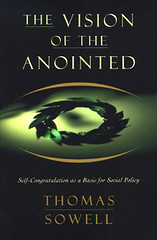 Berin recently encouraged me to re-read Thomas Sowell's The Vision of the Anointed: Self-Congratulation as a Basis for Social Policy, which I hadn't looked at since I first read it back in 1995 or 96. I'm glad I did since Sowell's work has always been profoundly influential on my thinking (especially his masterpiece, A Conflict of Visions) and I had forgotten how useful The Vision of the Anointed was in helping me understand the reoccurring model that drives ideological crusades to expand government power over our lives and economy.
Berin recently encouraged me to re-read Thomas Sowell's The Vision of the Anointed: Self-Congratulation as a Basis for Social Policy, which I hadn't looked at since I first read it back in 1995 or 96. I'm glad I did since Sowell's work has always been profoundly influential on my thinking (especially his masterpiece, A Conflict of Visions) and I had forgotten how useful The Vision of the Anointed was in helping me understand the reoccurring model that drives ideological crusades to expand government power over our lives and economy.
"The great ideological crusades of the twentieth-century intellectuals have ranged across the most disparate fields," Sowell noted in the book. But what they all had in common, he argued, was "their moral exaltation of the anointed above others, who are to have their different views nullified and superseded by the views of the anointed, imposed via the power of government." (p. 5) These elitist, government-expanding crusades shared several key elements, which Sowell identified as follows:
- Assertion of a great danger to the whole society, a danger to which the masses of people are oblivious.
- An urgent need for government action to avert impending catastrophe.
- A need for government to drastically curtail the dangerous behavior of the many, in response to the prescient conclusions of the few.
- A disdainful dismissal of arguments to the contrary as either uninformed, irresponsible, or motivated by unworthy purposes.
You can see this model at work on a daily basis today with our government's various efforts to reshape our economy, but I think this model is equally applicable to debates over social policy and speech control. In particular, the various "technopanics" I have been writing about recently fit this model. (See
1,
2,
3,
4,
5). For example, consider how this plays out in the debate over online social networking:
- Assertion of a great danger to the whole society [online sexual predators], a danger to which the masses of people are oblivious.
- An urgent need for government action [online age verification or the Deleting Online Predators Act] to avert impending catastrophe.
- A need for government to drastically curtail the dangerous behavior of the many [must stop kids and adults from being online together on same sites], in response to the prescient conclusions of the few [state Attorneys General].
- A disdainful dismissal of arguments to the contrary as either uninformed, irresponsible, or motivated by unworthy purposes [basically, child safety researchers and others are told that their research is meaningless and that they should just buzz off].
And I think you can see how the model has played out in other debates, such as efforts to regulate "excessively violent"
video games and
television.
Or consider how this model plays out on the privacy front:
- Assertion of a great danger to the whole society [amorphous privacy violations], a danger to which the masses of people are oblivious.
- An urgent need for government action ["baseline federal privacy regulation"] to avert impending catastrophe.
- A need for government to drastically curtail the dangerous behavior of the many [stupid people who share information online!], in response to the prescient conclusions of the few [handful of over-zealous privacy advocacy groups].
- A disdainful dismissal of arguments to the contrary as either uninformed, irresponsible, or motivated by unworthy purposes [basically, any suggestion that the issues are being overblown and that most information-sharing is socially beneficial is dismissed out-of-hand].
Again, it's all blatant elitism when you get right down to it. And facts are usually the first casualty of the war.
